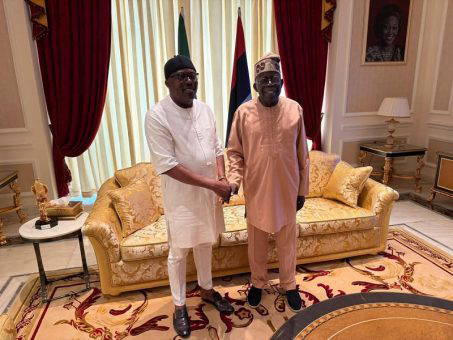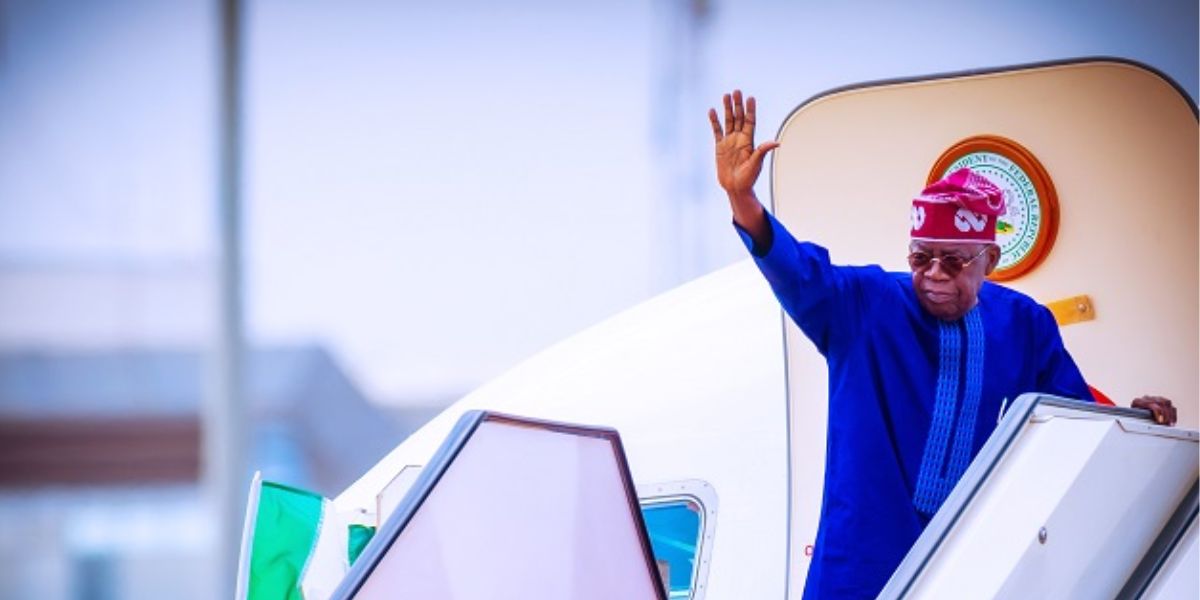News
Focus on Disability Foundation Names Rilwan Olawale As Global Ambassador

By Eric Elezuo
The Founder/Chief Executive Officer, Focus on Disability Foundation, with branches in the United Kingdom, Nigeria, Ghana among others, Mr Abiodun Enitari Paseda, has announced notable philanthropist and Community leader, Alhaji Rilwan Olawale, as the foundation’s latest global ambassador.
Olawale, who is the Chairman, Rilyek Synergy Nigeria Limited as well as the Olori Odo of ijora kingdom in Lagos State, is reputed as a down to earth grassroots personality, whose stock in trade is the care of the needy in the society.
Announcing his appointment, Paseda said that Alhaji Olawale’s heart and desire to reach out to the unreached among other rare qualities he possesses forms the basis for his choice as a global ambassador of the FOD brand.

“Here’s a man whose thoughts are always centred on how to be of assistance to the needy and indigent in the society. He is one of a kind, and that is why he deserves the honour of a global ambassador for Focus on Disability Foundation,” Paseda said.
In his response, free minded philanthropist, who is known in the social circle as Cooler, said he feels honoured to be considered for the position, adding that he would not rest on his oars, but intensify his efforts to reach out to as many that needs his assistance to the best of his abilities.
“I am so honoured to be considered as global ambassador of Focus on Disability Foundation. I promise to continue in my efforts to see to the needs of those who genuinely needs my assistance to the best of my abilities.

I thank the Founder, Abiodun Paseda, for this consideration. God will help us,” he said.
Focus on Disability Foundation is a non governmental organization saddled with the responsibility of taking care of the needs of the disabled among other indigents in the society. It was founded by Mr. Abiodun Paseda, and the organization has done so much charity work in various parts of Nigeria and United Kingdom.
News
Court Remands Ex-AGF Malami, Son, Wife in Kuje Prison

The Federal High Court In Abuja on Tuesday ordered the remand of the Former Attorney-General of the Federation and Minister of Justice, Abubakar Malami (SAN), at the Kuje Correctional Centre pending the hearing and determination of their bail application.
The trial judge, Justice Emeka Nwite, also ordered the remand of his co-dedendants, his son, Abubakar Malami, and one of his wives Bashir Asabe.
Justice Nwite made the order after taking arguments from the defence team led by Joseph Daudu (SAN) and the prosecution counsel Ekele Iheneacho (SAN).
Malami and his co-defendants are facing a 16-count money laundering charge preferred against them by the Economic and Financial Crimes Commission.
The EFCC alleges that the defendants conspired at various times to conceal, retain and disguise the proceeds of unlawful activities running into several billions of naira.
According to the charge, the alleged offences span several years and include the use of companies and bank accounts to launder funds, the retention of cash as collateral for loans, and the acquisition of high-value properties in Abuja, Kano and other locations.
The commission further alleges that some of the offences were committed while Malami was serving as Attorney-General of the Federation, in breach of the Money Laundering (Prohibition) Act 2011, as amended, and the Money Laundering (Prevention and Prohibition) Act 2022.
News
2027: Backing Tinubu Not Guarantee for Second Term Ticket, Wike Mocks Fubara

Minister of the Federal Capital Territory (FCT), Nyesom Wike, has sent a veiled message to Rivers State governor, Siminalayi Fubara, saying support for President Bola Tinubu alone will not guarantee any election ticket.
Wike made the statement on Sunday during a public outing in Emohua Local Government Area of Rivers State.
His remarks were widely seen as directed at Governor Fubara, amid lingering political crisis in the State.
The former Governor of Rivers State said political loyalty must be tested during difficult times, not after power has been secured.
He mocked those he described as late supporters of President Tinubu, insisting that sudden alignment would not earn political rewards.
He said: “So the issue is not whether you are supporting Tinubu. That one, we have taken too long, long… Yes, oh. So Tinubu’s issue is not an issue again. Yes. Do you understand me? Yes. Tinubu’s issue is that nobody should be coming here to tell a day. We are for Tinubu; I am against you. Who is for Tinubu University? (laughs) That cannot give you any ticket oh! (laughs again) Direct, direct. It will not. Direction. Direction.”
Wike stressed that his political camp stood with Tinubu when the decision was unpopular. He said that support given under pressure carries more weight than alignment after victory.
He also recalled how the Rivers State House of Assembly openly backed Tinubu early, long before the election outcome was certain.
According to him, some of those now making public declarations were absent during the critical period.
“The same people now who came to declare, put them to God… But they should declare they are saying it for a candidate. Yes. Don’t you see characters? (laughs) So I send the sword far ahead of them.”
Wike further spoke on governance and continuity. He defended projects and agreements initiated during his tenure as governor. He said it is often difficult for successors to acknowledge past efforts, even though government is a continuous process.
His comments come weeks after Governor Fubara formally aligned with the All Progressives Congress (APC), the party of President Tinubu.
The move followed months of political crisis in Rivers State, which led to federal intervention and a declaration of emergency rule.
Political watchers believe Wike’s remarks constitute a direct response to Fubara’s recent positioning as a key Tinubu ally in Rivers politics. Critics argue that Fubara’s support surfaced only after the political storm had settled.
Wike, who remains a dominant force in Rivers State politics despite serving in Abuja, appears to have drawn a clear line ahead of the 2027 elections.
He suggested that political tickets would be decided by proven loyalty, not convenience.
Videos from the event in Rumuche, Emohua, spread rapidly on social media. Many users described the speech as a coded warning to the governor.
As of press time, neither the Rivers State Government nor Wike’s media team had issued an official clarification.
The comments, however, suggest that the political rift between both camps is still active, despite earlier peace moves brokered at the national level.
News
ADC, LP Knock Tinubu for Jetting Out to Europe Amid Security Crisis

The opposition African Democratic Congress and the Labour Party on Sunday criticized President Bola Tinubu for departing Nigeria for Europe on holiday at a time the country is grappling with rising insecurity, including foreign military interventions in the North.
The Presidency announced on Sunday that Tinubu left Lagos for Europe for his end-of-year holiday ahead of an official visit to Abu Dhabi, United Arab Emirates, where he is scheduled to attend the 2026 edition of the Abu Dhabi Sustainability Week Summit.
President Tinubu’s Special Adviser on Information and Strategy, Bayo Onanuga, explained that the trip was by invitation from His Highness Sheikh Mohamed bin Zayed Al Nahyan, President of the UAE, to participate in the summit, which gathers global leaders from government, business, and civil society to advance sustainable development strategies.
“His Highness Sheikh Mohamed bin Zayed Al Nahyan, President of the United Arab Emirates, has invited President Tinubu to participate in the 2026 edition of Abu Dhabi Sustainability Week Summit, which will take place in the emirate early in January,” the statement read.
Reacting to Tinubu’s departure, the ADC, in a statement by its National Publicity Secretary, Bola Abdullahi, faulted the timing as inappropriate given the security challenges facing the country.
The ADC noted the deadly terrorist bomb blast in Zamfara and the ongoing foreign military involvement, calling the President’s move insensitive.
“President Bola Ahmed Tinubu’s lack of care is alarming. In the wake of another deadly bomb blast in Zamfara, and following an unprecedented foreign military attack on Nigerian soil, the nation is waiting for reassurance from its leader. Instead, we learn the President has gone on holiday. What a President!” Abdullahi said.
Similarly, LP’s acting National Chairman, Senator Nenadi Usman, described the trip as “insensitive and devoid of empathy” for Nigerians facing violent attacks and humanitarian crises.
Speaking through her Senior Special Adviser on Media, Ken Asogwa, she stressed that the President should have remained in the country to coordinate security responses.
“This is the most inauspicious time for the President to leave the country. Even the Christmas holiday in Lagos seems ill-timed, given that a bomb exploded in Zamfara today, killing nine people,” Usman said.
She further alleged that Nigeria was under external attack and accused the government of downplaying the severity of the situation.
“Nigeria is under attack by a foreign nation. No matter how the government tries to frame this, it is a violation of our sovereignty. This is the time for the commander-in-chief to coordinate the response, not embark on a holiday,” Usman said.
She added that the President had not convened critical security meetings since the U.S.-led bombardment of terrorist camps in Kwara and Sokoto States and condemned the perceived lack of engagement with military leadership.
The President’s trip comes amid heightened security concerns. On Thursday, U.S. President Donald Trump authorised AFRICOM to conduct airstrikes on terrorist camps in Sokoto State, hours before Nigeria’s Ministry of Foreign Affairs acknowledged the operation. A deadly bomb blast in Zamfara on Friday claimed several lives.
The 17th edition of Abu Dhabi Sustainability Week will run from January 11 to 15 at the Abu Dhabi National Exhibition Centre under the theme “The Nexus of Next: All Systems Go.”
The event aims to connect innovation, finance, and people to advance sustainable development.
Onanuga confirmed that Tinubu would return to Nigeria after the summit.
Hosted by Masdar, the UAE’s clean energy company, the summit will feature the invitation-only ADSW Summit, the World Future Energy Summit, the Zayed Sustainability Prize Awards Ceremony, and specialised sessions on hydrogen, climate finance, water security, and utilities in the Global South. Organisers expect more than 50,000 participants from over 170 countries, featuring over 700 global brands and exhibitions of emerging clean technologies.
The UAE Minister of Industry and Advanced Technology, Dr Sultan Al Jaber, noted that ADSW 2026 builds on two decades of the UAE’s leadership in renewable energy.
Tinubu previously attended the Abu Dhabi Sustainability Week in January 2025, where he held meetings with Gulf investors and officials on trade, energy cooperation, and climate finance.
Since assuming office on May 29, 2023, Tinubu has undertaken at least 46 foreign trips, spending an estimated 192 days abroad as of October 2025. In 2025 alone, he travelled internationally no fewer than 15 times to countries including Ghana, the UAE, Tanzania, France, Italy, Saint Lucia, Japan, and Brazil for summits, bilateral engagements, and holidays.






